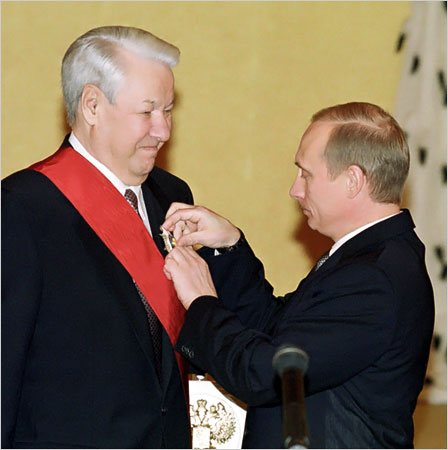|
|
U.S.RussianBusiness Beyond an occasional news story |
Site
Menu
 |
|
Russia's
Virtual Economy
The virtual economy was the name given to the system of informal rent-sharing or value distribution that prevailed in Russia in the 1990s. Featuring widespread use of nonmonetary exchange and nonmarket prices to conceal transfers of value from especially resource sectors to manufacturing industry, the virtual economy reached a peak in the run-up to the country’s financial crisis in August 1998. The strategies used by enterprise directors to participate in this nonmonetary economy fundamentally changed the behavior of hundreds and thousands of noncompetitive manufacturing enterprises in Russia during the transition process. The behavioral adaptation permitted enterprises to survive in the transition environment where they ought to have failed. The expectation had been that when the old Soviet industrial structure was shocked by the sudden collapse of central planning and the subsequent launching of radical market reforms — including mass privatization and elimination of overt subsidies — economic agents would be forced to change their behavior to become competitive in a market economy. The transition was thus intended as a Darwinian process whereby only those enterprises that could transform themselves into competitive operations would survive. But in the case of Russia, the dinosaurs survived — without restructuring. They did change. Only, instead of adapting to the market, they changed to protect themselves from the market.
In essence the virtual economy was a peculiar system of
rent distribution in which the primary vehicle through
which agents laid claim to rents was production. The
virtual economy was the set of informal institutions that
facilitated the production of goods that were value
subtracting, that is, worth less than the value of the
inputs used to produce them. Enterprises were able to
engage in such production because they had recipients who
were willing to accept fictitious (nonmarket) pricing of
the goods at levels that masked their lack of
profitability. Buyers and sellers colluded to hide the
fictitious nature of the pricing. In the classic form of
the virtual economy, they did so by avoiding money, instead
using barter and other forms of nonmonetary exchange, as
well as even more intricate subterfuges.
Since value was being destroyed as the system operated, there had to be a source of value. The ultimate “value pump” in Russia was the fuel and energy sector, above all one single company, Gazprom — Russia’s natural gas monopoly. In exchange for the rights to keep what it earned from exports, Gazprom pumped value into the system by supplying gas without being paid for it (or, more generally, at a cost that was low enough to keep enterprises operating). Gazprom subsidies, which then led to arrears to the government, were the primary way in which unprofitable activity was supported in Russia.
The virtual economy evolved and persisted because it met the needs of so many actors in the economy. Workers and managers at industrial dinosaurs benefited because the virtual economy postponed the ultimate reckoning for loss-making firms. Government, especially at the subnational level, where much of the important action took place, benefited because the virtual economy system maintained employment and the provision of social services. Gazprom also benefited, since the value transfers it made to the virtual economy earned it the right to appropriate the massive rents from exports. The roots of the virtual economy mechanisms lay in the Soviet system, especially the production relationships that had developed under the Soviet command economy. These relationships represented a peculiar type of asset, “relational capital,” which supplemented the enterprise’s conventional physical and human capital. Thanks to relational capital, market reform policies did not necessarily compel the enterprise to restructure to be able to compete in the market environment. Enterprises chose between whether to become more competitive in the market, by investing in physical and human capital, or to be better protected from the market, by investing in relational capital.
The Term The term “virtual economy” was coined in 1998 by Gaddy and Ickes, building on terminology in a Russian government report from 1997. In early 1996, alarmed by the extent of tax delinquency in the country, President Boris Yeltsin appointed a special blue-ribbon panel to investigate the low rate of collection of taxes in Russia. Presenting its findings after an 18-month investigation, the panel reported that the country’s largest companies conducted 73 percent of all their business in the form of barter and other nonmonetary forms of settlement. Especially alarming was the extent of nonmonetary payments of taxes. During the period of review, these large enterprises paid less than 8 percent of their tax bills in actual cash.
They simply failed to meet 29 percent of their obligations
at all, while “paying” the remaining 63 percent in the form
of offsets and barter goods. The market value of the goods
delivered was far below the nominal price used in the
offsets, leaving the government with substantially less in
real revenues than officially accounted for. In summing up
their own conclusions about the contemporary Russian
economy, the investigatory commission wrote:
An economy is emerging where prices are charged which no one pays in cash; where no one pays anything on time; where huge mutual debts are created that also can’t be paid off in reasonable periods of time; where wages are declared and not paid; and so on. [...] [This creates] illusory, or virtual earnings, which in turn lead to unpaid, or virtual fiscal obligations, [with business conducted at] nonmarket, or virtual prices. (Karpov, 1997). Gaddy and Ickes (1998) suggested that the entire system be called a virtual economy “because it [was] based on illusion, or pretense, about almost every important parameter of the economy: prices, sales, wages, taxes, and budgets.” The pretense that had become the norm was as characteristic of the virtual economy as were the colorful forms of nonmonetary exchange.
| ||||||||||||||||||||||||
|
|
|
|
|
Special
Note
|
|
© Copyright FertiKola, 2008. All Rights
Reserved.


 Gazprom
subsidies, which then led
to arrears to the
government, were the
primary way in which
unprofitable activity was
supported in
Russia.
Gazprom
subsidies, which then led
to arrears to the
government, were the
primary way in which
unprofitable activity was
supported in
Russia. 

 back to
back to